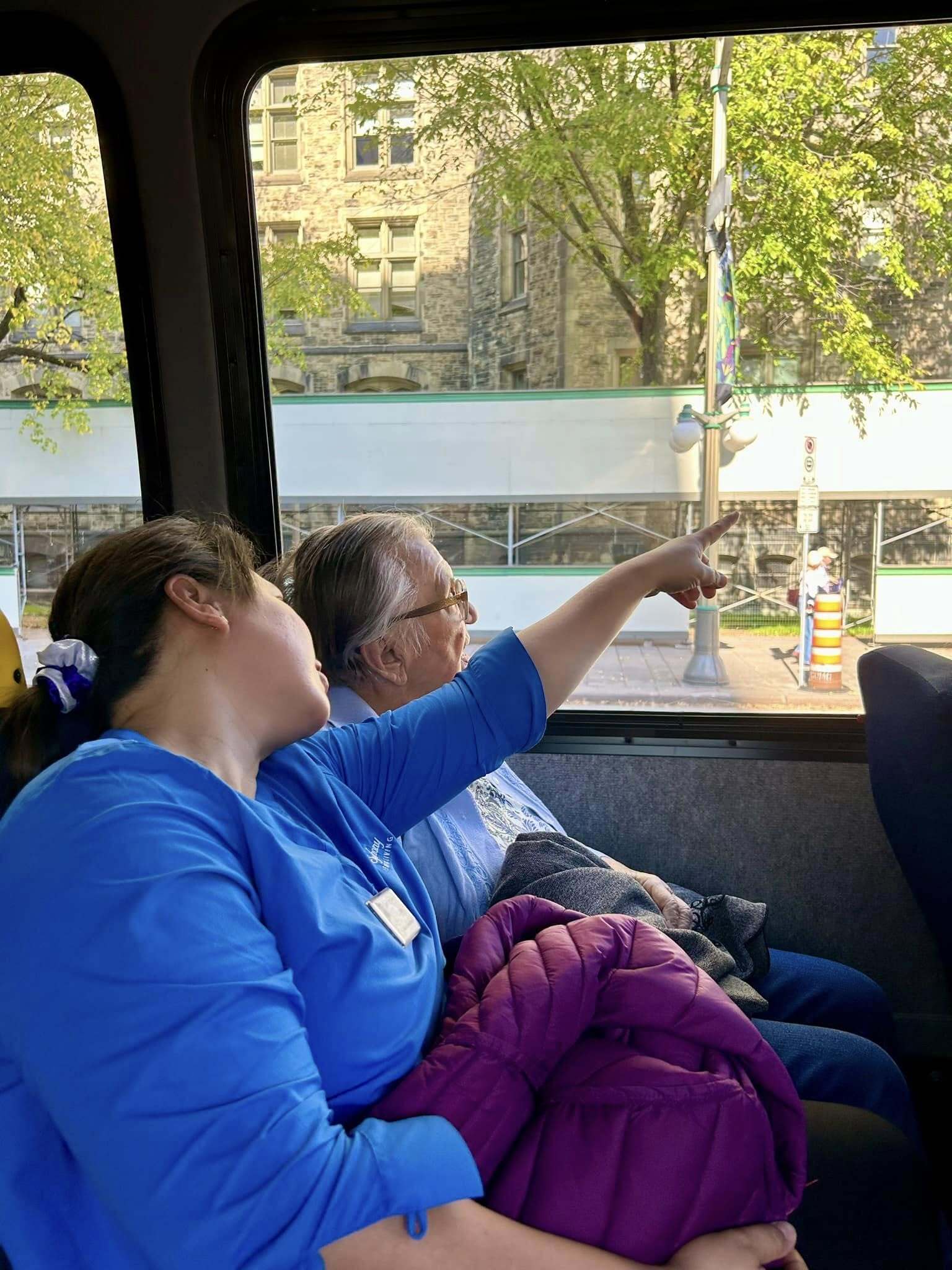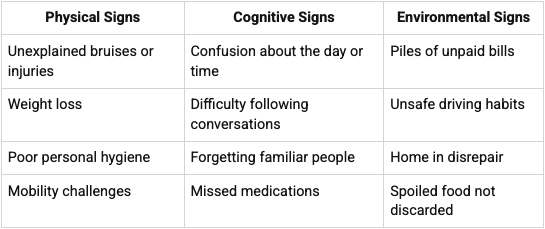
Email
27 Weaver Crescent Kanata,
ON K2K 2Z8
Living Options
Carleton Place Terrace
Forest Valley Terrace
Symphony Kanata
Symphony Orleans
Learn compassionate strategies for talking to aging parents about moving to a senior community.

Starting a conversation about moving to a senior community with your parents ranks among the most emotionally charged discussions you'll ever have. You love them. You want what's best for them. And yet, the words seem to catch in your throat before you even begin.
This guide will walk you through practical strategies for talking to aging parents about their care needs, help you choose the right timing and approach, and provide conversation frameworks that acknowledge their independence while addressing your genuine concerns. By the end, you'll feel more confident navigating this sensitive family senior care planning discussion.
In short, when your parent needs more support than their current living situation provides. You notice this through missed medications, unopened mail, spoiled food in the fridge, or a home that's no longer being maintained. Falls become more frequent. Driving feels unsafe. Loneliness sets in.
Trust your observations. If you're questioning whether it's time, that internal alarm usually signals something real. Look for patterns rather than isolated incidents. One forgotten appointment differs from consistently missing important obligations.
Key indicators include:

Read more: What to Expect from Memory Care with 'My Home'
Preparation transforms anxiety into action. Start by researching senior living options in your area well before the conversation. Explore different lifestyle options to understand what's available, from independent living to memory care.
Have specific information ready. Your parents will ask questions, and vague answers create more resistance. Know the costs, visit communities if possible, and gather brochures or website links. The more informed you are, the more confidence you project.
Equally important is examining your own emotions. Are you feeling guilty? Anxious? Relieved? Acknowledge these feelings privately so they don't unconsciously drive the conversation. This discussion serves your parents' needs, not your emotional comfort.
Preparation checklist:
Read more: Top 5 Myths About Assisted Living
Frame the conversation around possibilities rather than limitations. Instead of "You can't live alone anymore," try "I'd love to talk about how we can make sure you're safe and happy in the years ahead."
Use "I" statements that express your feelings without blame. "I worry when I can't reach you by phone" works better than "You never answer your phone." This approach reduces defensiveness and opens dialogue.
Ask open-ended questions. "How do you feel about where you're living now?" or "What would make your daily life easier?" These questions invite your parent into the decision-making process rather than presenting them with an ultimatum.
Conversation starters that work:
An elderly parent needs to hear that assisted living represents freedom, not loss. The message centres on what they gain rather than what they give up: freedom from home maintenance, from cooking every meal, from isolation, from worry about emergencies.
Share your specific concerns with compassion. "Dad, I'm concerned because you've fallen twice in three months. That scares me. I want to explore options that give you support while keeping your independence." This approach combines honesty with love.
Involve them in every decision. Visit communities together. Let them ask questions. Respect their timeline within reason. When people feel they're making a choice rather than being forced, resistance falls away.
Avoid comparing them to other elderly people or using age as a weapon. "Mrs. Johnson moved last year, and she's fine," dismisses their unique situation. Similarly, "You're too old to live alone" attacks their identity rather than addressing specific concerns.
Skip the catastrophic predictions. "What if you fall and can't reach the phone?" creates fear without offering solutions. Instead, focus on present realities and positive alternatives.
Never discuss this topic when emotions run high or during family gatherings where your parent might feel ambushed. Privacy and respect matter enormously.
Topics to handle carefully:
Read more: Navigating the Emotional Journey of Moving to Assisted Living
A person with dementia can refuse care home placement if they retain legal decision-making capacity. Capacity means understanding information, weighing options, communicating a decision, and retaining that information long enough to make the choice.
Early-stage dementia doesn't automatically remove someone's right to decide. However, as the condition progresses, family members may need to pursue legal guardianship or rely on advance directives like power of attorney to make decisions in the person's best interest.
This reality makes early conversations even more valuable. Discussing preferences before cognitive decline advances allows your parent to participate meaningfully in planning their future care.
Elderly people without family support can access community resources and government programs. Social workers, through hospitals or community health centres, help coordinate care. Adult Protective Services intervenes in cases of neglect or self-neglect.
Many seniors build chosen families through friendships, neighbours, or faith communities who step into caregiving roles. Professional care managers can also coordinate services for isolated older adults who can afford private pay options.
This situation highlights the importance of proactive planning. Establishing connections with a senior home community creates a built-in support network even for those without nearby family.
You reduce worry through action and boundaries. Create a care plan that addresses your specific concerns. If falls worry you, arrange for medical alert systems. If isolation concerns you, help them find social connections.
Set realistic expectations for yourself. You cannot prevent every negative outcome or be available 24/7. Accepting this limitation doesn't make you a bad child; it makes you human.
Regular check-ins, whether daily phone calls or weekly visits, provide reassurance for both parties. When your parent lives in a supportive community, professional staff handle day-to-day concerns, allowing you to return to being their child rather than their full-time caregiver.
The conversation about senior living options rarely happens just once. Think of it as an ongoing dialogue that evolves as circumstances change. Your parent might need time to process, grieve the loss of independence, and gradually accept that change would benefit them.
Patience serves you both. So does persistence. If the first conversation doesn't go well, step back and try again later with a different approach. Involve trusted family friends, clergy members, or your parents' doctor if you're meeting strong resistance.
Remember that this decision ultimately expresses love. You're advocating for their safety, health, and quality of life. That love will come through in your words when you speak from genuine care rather than frustration or duty.
How to tell an elderly parent they need assisted living?
Let your elderly parent know that assisted living would provide them with support while maintaining their independence. Focus on specific benefits, such as social activities, prepared meals, and 24-hour assistance, rather than dwelling on their limitations.
What to do with a parent who can't care for themselves?
A parent who cannot care for themselves requires immediate intervention. Start by scheduling a medical evaluation to assess their needs, then explore in-home care services or residential care options. Consult with an elder law attorney about legal arrangements if your parent lacks decision-making capacity.
How do you know when it's time to place a parent in assisted living?
You know it's time for assisted living when your parents' safety is at risk, their health is declining due to self-care difficulties, or isolation is affecting their mental well-being. Multiple falls, missed medications, or inability to manage daily tasks signal that additional support is needed.
What not to say to elderly parents?
Do not say anything that diminishes their autonomy or dignity. Avoid phrases like "You're too old," "You can't do that anymore," or "We're putting you in a home." Instead, use respectful language that acknowledges their feelings while addressing legitimate concerns.
Can a person with dementia refuse to go into a care home?
A person with dementia can refuse care home placement if they still possess legal decision-making capacity. However, if their dementia has progressed to the point where they cannot understand information or make safe decisions, family members or appointed guardians may need to make care decisions on their behalf.
Visit our FAQ page for more information.
Starting the conversation about moving to a senior community challenges even the closest families. Yet approaching this discussion with preparation, empathy, and respect for your parents' autonomy creates space for honest dialogue about their needs and your concerns.
The goal isn't to win an argument or force a decision. Your aim is to open a conversation that continues over time, allowing your parent to participate in shaping their future while ensuring they receive the care and support they deserve. With the right approach, this transition can strengthen your relationship rather than strain it.
Take the first step today. Choose a quiet moment, lead with love, and trust that this difficult conversation represents one of the most caring acts you can offer the parents who once cared for you. Let us know if we can help.


We are so grateful to Forest Valley Terrace for providing our mother with a lovely, caring place to live.



Pat said that within a day of arriving, she felt that it was home. She feels that she is really living, and it is finally the beginning of her life.



Lise came to Symphony Orleans two and a half years ago wanting to downsize and start a new chapter in her life.



Helen felt that everything she needed was at Carleton Place Terrace and she would never have to leave, despite her growing needs in the future.
